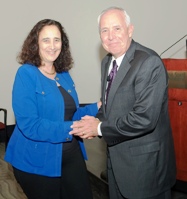
The leader of the organization that represents the nation's medical schools, teaching hospitals and academic societies delivered a poignant message during his visit to the Wayne State University School of Medicine: It won't be Congress that reforms the nation's health care system; it will be the faculties of medical schools and their hospital partners.
Darrell G. Kirch, M.D., president and chief executive officer of the Association of American Medical Colleges, toured the School of Medicine campus Wednesday and met with school leadership, students and representatives of the school's affiliated hospitals.
Dr. Kirch also gave a presentation, "This Time It Really Is Different," on the changes - and sometimes the lack of changes to date - put into effect by national health care reform legislation. His talk in the Margherio Family Conference Center was attended by School of Medicine faculty, students, representatives of other WSU colleges and hospital leaders.
The nation's economic viability, he said, hinges on health care and its costs. Noting the current national cost of health care -- $2.6 trillion - Dr. Kirch said, "I wouldn't mind paying 20 percent of gross domestic product for health care if we had far and away the best outcomes in the world. But we don't."
Noting that the issue of health care reform quickly diminished to insurance expansion and reform after the concept was initially introduced, Dr. Kirch said today's "total political gridlock" means the nation cannot look to Congress for true health care change. Even though health care and how to reform it and cover its costs will be at the epicenter of the new 12-member "super committee" recently formed by Congress, he offered little optimism for effective change coming from politicians.
It won't be Congress, lobbyists or insurance companies that bring true change and improvement in the health care system, he said. Instead, the visionaries and pioneers will be those teaching at the nation's medical schools, working in conjunction with the hospitals at which faculty and residents provide care.
Just as the nation 150 years ago established land grant colleges and universities to educate a new nation about how to improve agricultural systems and the use of resources, Dr. Kirch said that the issue of health care is the "analogous problem of the 21st century."
"You can help transform medical care delivery," he said, calling for health care innovation zones that would allow medical colleges and their affiliated hospitals the latitude to improve health care delivery in a manner tailored to their individual regions.
"We need to implement what we learn in academic research and take that innovation to medicine. You are the only people who can do that," he said. "Who will rise to the challenge? There are people who are ready to rise to the challenge, and some of them are sitting in this room. We need a major change agent in health care."